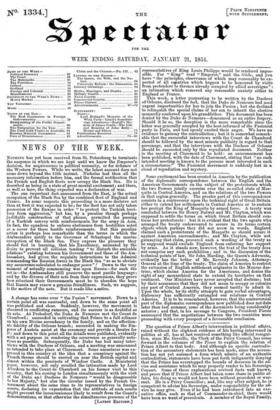A change has come over " the Fusion" movement. Down
to a certain point all was successful, and down to the same point all was published and clear. Suddenly, however, the movement is obscured in conflicting rumours, and its success is as doubtful as its acts. At Frohsdorf, the Duke de Nemours met the Count de Chambord ; succeeded in cultivating that Prince to a full reliance on his own Divine ascendancy in the family, and on the affection- ate fidelity of the Orleans branch; succeeded in making the Em- peror of Austria assist at the ceremony and provide a theatre for it: and down to this point all the details were published, evidently with a set purpose in rendering the occurrence as generally noto- rious as possible. Subsequently, the Duke has had mtuiy inter- views with the Duchess of Orleans, and a meeting was announced as intended to take place at Claremont. Some uneasiness was ex- pressed in this country at the idea that a conspiracy against the French throne should be carried on near the British capital and almost within the precincts of Windsor Castle. A Ministerial paper, however, not only recalled the intimation made by Lord Aberdeen to the Count de Chambord on his former visit to this country, that his coming to London simultaneously with the visit of the Duke and Duchess de Nemours " would be disagreeable to her Majesty," but also the circular issued by the French Go- vernment about the same time to its representatives in foreign courts, declaring its expectation that the attitude of such courts might prevent the inconveniences likely to result from the Count's demonstrations, or that otherwise the simultaneous presence of the representatives of King Louis Philippe would be rendered impos- sible. For " King" read " Emperor," said the Globe, and you have " the principles, observance of which may reasonably be ex- pected of all countries which happen to be honoured by visits from pretenders to thrones already occupied by allied sovereigns" : an intimation which removed any reasonable anxiety either in England or France.
This week, a letter purporting to be written by the Duchess of Orleans, disclosed the fact, that the Duke de Nemours had used urgent importunities for her to join the Fusion ; but she declined to relinquish the special claims of her son to inherit the elective monarchy conferred upon his grandfather. This document has been denied by the Duke de Nemours—denounced as an entire forgery. Should it be so, the deception is the more remarkable since the letter was generally accepted by the best-informed of the Fusionist party in Paris, and had openly excited their anger. We have no evidence to gainsay the contradiction ; but it is somewhat remark- able that the successful interviews with the Count de Chambord should be followed by the most minute publicity in regard to that personage, and that the interviews with the Duchess of Orleans should be succeeded only by this repudiated document. Neither is the meeting at Claremont to be held : an announcement has been published, with the date of Claremont, stating that "no such intended meeting is known to the persons most interested in such a circumstance." The Fusionist movement is suddenly lost in a cloud of repudiation and mystery.


































